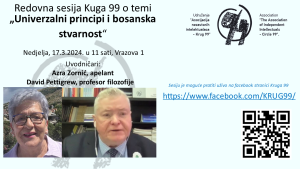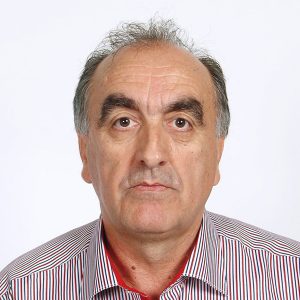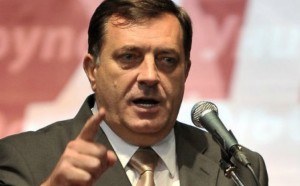Alliance of Desperation: the EU and BiH’s Political “Elites”

| 9 June 2022 – 8 |
| The title of Dr. Bassuener’s opening statement for the discussion with Circle 99 refers to what is evidently a common interest of BiH’s political class and the EU to come to some accommodation regarding the election law / “limited constitutional reform,” despite – or rather, because of – repeated failure to date. For BiH’s dominant political leaders, especially HDZ BiH leader Dragan Čović, the desperation is obvious and palpable. Čović sees his window of opportunity closing to lock-in a more hermetically sealed version of ethnic party-led feudalism than BiH already has. His longstanding threat to prevent elections from being held has been backed by Zagreb, with the HDZ pushing the agenda in the EPP ranks and the European Parliament – without success, thus far. President Milanović’s threat to prevent Sweden and Finland from being invited to join NATO – while to my understanding not within his constitutional power – serves to demonstrate how for most of the Croatian political spectrum, BiH is viewed solely through the ethnic lens. Yet the EU also radiates desperation for some sort of “deliverable,” as evidenced by European Council President Charles Michel’s visit. Anything to signify progress on the “European path” for BiH would be cited as evidence that a long-failing EU enlargement policy here in BiH – indeed regionwide – is not failing. The amount of transatlantic political capital devoted to the election law issue has yielded nothing to date; the messaging from the US and UK now seems focused on ensuring elections are held on time and throughout the country. But the EU posture seems intent on grasping for some evidence to prove its vaunted “transformative power” to itself, not to BiH or Western Balkan peoples. This week’s meeting of the Peace Implementation Council Steering Board will likely showcase these frictions. This display is particularly jarring given the tectonic shift precipitated by Russia’s full-scale assault on Ukraine since February 24th. Since then, there have been unprecedented demonstrations of Western unity – and regular declarations about the primacy of democratic values and human dignity in the Western discourse. Ukraine’s staunch resistance and determination, so ably represented and articulated by President Volodomyr Zelenskyy, is largely responsible for this phenomenon. Despite numerous caveats, this unity and support – however late and spotty – for Ukraine’s self-defense is greater than certainly Putin, as well as many of us, would have believed. And yet, despite this undeniable movement, this has yet to manifest itself to any considerable degree in the Western Balkans. If united, the West has the greatest leverage and widest possible toolbox in this region to affect the dynamic, prevent and deter negative developments, and enabling progress where the organic impetus for it can develop. For well over a decade, divergent threat perceptions were evident and qualified that potential unity. But even now, despite declarative recognition of the risk potential, and its advantageous structural position, the West continues to allow the agenda to be set by the most retrograde and reactionary political actors – and not just in BiH. In BiH’s case, the system is typified as a business model that no major political actors wish to fundamentally change, but rather participate in. Their meeting point is ensuring impunity, avoiding accountability o to citizens politically and legally. SDA leader Bakir Izetbegović would inherently benefit from a formal feudal carve-up with the HDZ; the problem for him is not a moral impediment, but a marketing problem. He could only have a chance selling it if it appeared he bent to Western, especially American, pressure. Several speakers underscored BiH’s vulnerability in the context of Russia’s invasion of Ukraine – and the need for NATO to be prepared to assume the Annex 1A responsibility to maintain a “safe and secure environment” in BiH. Divisions within the “international community” also were repeatedly referenced in the discussion, including limitations placed on the High Representative to fulfill his role, including use of the executive “Bonn Powers.” Some speakers questioned why the High Representative (both the incumbent Christian Schmidt and his predecessor Valentin Inzko) didn’t receive greater criticism for being inert in the face of challenges to BiH statehood and security. Bassuener noted that the divisions within the West were heavily to blame, with the EU institutions and several member states seeming more intent on avoiding use of Bonn Powers than anything else in BiH. The negative role of BiH’s neighbors Serbia and Croatia in the country’s internal affairs – the latter abetted by both its membership in the EU and the ruling HDZ’s membership in the European People’s Party – surfaced repeatedly among Krug 99 speakers. The recent Croatian Academy of Arts and Sciences (HAZU) paper advocating a Croat third entity in BiH was mentioned – as was the fact that any Croat entity would by its nature leave Croats from central Bosnia and Posavina outside it. “Open Balkans,” seen as a stalking horse for Serbian economic irridentism (and linked the quasi-official Srpski Svet ideology) also came up repeatedly as a threat – one curiously supported by Washington. The systemic nature of malgovernance of BiH ran like a seam through the entire discussion. “We want the plunder to end!,” one speaker noted, referring to what he called “general injustice.” “How do we move forward against BiH politicians and the EU at the same time?,” he asked. Several other speakers also asserted that the problem was institutional, sparing no parties, including those often termed “pro-Bosnian.” Numerous discussants expressed their view that the October 2022 general elections, even if held on time, would change little. In light of the Russia’s aggressive efforts to undo the post-Cold War order, one speaker asked both about the scheduled Lavrov visit to Belgrade (subsequently cancelled), where he was to meet Milorad Dodik, as well as what he saw as “EU institutional reluctance to prevent Russian influence in BiH.” *** Summary of Session of 5 June 2022 The presenter at this session was Dr. Kurt Bassuener, Senior Associate, Democratization Policy Council, Berlin Adil Kulenović, President |
| Association of Independent Intellectuals – Circle 99 (Bosnian: Krug 99), a leading Bosnian think-tank, was established in Sarajevo in 1993, in the midst of the Bosnian war (1992-1995), while the capital was under siege. Circle 99 provides a platform to bring together intellectuals of various professional and ethnic identities; university professors, members of the Academy of Sciences and Arts of Bosnia and Herzegovina, artists, journalists, entrepreneurs, diplomats, and other prominent figures from Bosnia and from abroad. Multidisciplinary discussions and initiatives are held each Sunday throughout the academic year, in the form of regular sessions about politics, science, education, culture, economy, and other societal issues. The overall goal is to sensitize the public towards a democratic transformation, achieving and maintaining peace, and integration of modern Bosnia into the community of countries fostering liberal democracy. Circle 99 has been declared an organization of special significance for the city of Sarajevo. |







